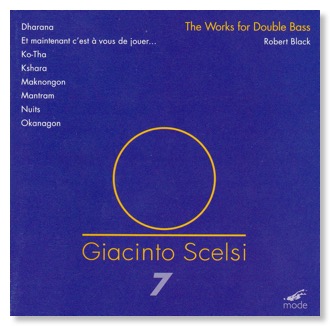夢枯記041 Robert Black (Giacinto Scelsi) | The Works for Double Bass
contrabass, cello, harp & tam-tam/cd/mode records/2007
http://www.robertblack.org

【Yumegareki 041】
"Utsukushii" music. From the darkness, a monk’s voice can be hard. Dewdrops of the mist that illuminate particles of a light imply the holy mountain peak. The evening sun is dazzling my ears. My skin is trembling. My reflection on the window is vague, melting me down. An intense light from the setting sun pierces into my eyes, whereas the silence enfolds and holds the faint playfulness of a light wave and the granulation of a sound stream. In a vivid but subtle movement of a sound, phonetic atoms are collapsing and converging, allowing the origin itself to become blur. Without realizing it, the air has changed. Just like the way the autumn is about to pass away, the time has already started to tick. A faint light created within a buried self-emitting light begins to change the color. It's a journey of light, swirling within the sound and breaking away from it. It's a music of a path created by the changing light.
Scelsi’s music is far more poetic than a pursuit of the tone of sound. Scelsi exists in the darkness of the world. If someone's voice, which depicts the moments of mutation, change and transition, is the invisible history to be heard, rather than the one expressed as a culmination of wisdom or political sediments, then, the music should live the moment within the time of history through sound, connecting directly to the origin itself. It appears that Scelsi tries to be the existence of time in another dimension, detaching himself from the visualized history. This is how Scelsi seems to sense an intense light in the sound. His music glows as if it had existed in time even before the sound started, gradually and abruptly falling down into the blackhall-like darkness.
I wonder if it is possible to express or define an amazing music with a single word, although it is impossible for a music made of simple words to shake me. When an experience of feeling a light, which exists neither within nor outside of me, suddenly comes to me, puts me in a total darkness and touches my skin to arouse a sense of fear, I am urged to express my feeling with a word, "Utsukushii." For Scelsi, music might have been a process of exploring a word of his own. His work appears to be a time-consuming impromptu rather than a music of the present-moment. It also seems like a record of occasional and natural memory of the musician. Throughout the album, Robert's performance remains outstanding. The most impressive part is the last piece, Mantram, a short bass solo music. It doesn't say when it was written, but it is different from the preceding ones in expressing the poetry of Scelsi. Although it appears simple, "Utsukushi-sa" of this piece and performance is something almost beyond description.
----------------------------------------------------------------------------------------------
一息ついた感もあって、自然光にうながされるようにこのアルバムを久しぶりにきいた。
うつくしい音楽。闇の中から僧侶の声がする。光の粒を照らす霧の露が山頂の華厳を暗示する。そして西日の閃光に耳が眩まされる。皮膚は震え、窓にうつされた朧げな私は溶けだす。強烈な斜陽がこの目に差し込んで、静寂が光の波の微かな戯れと音の気流の粒立ちを包みながら支えている。一つの音の鮮烈で微細な運動のなかで、音原子が崩壊し合わさりながら、始原が滲んでくる。いつの間にか空気が変化しすでに秋が過ぎ去ろうとしているこのいまのように、時間はもうはじまっている。埋もれた自明の光のうちに生じた微光が、徐々に色を変えながら音のなかに渦巻いては立ち去っていく光の旅、変化する光跡の音楽。
簡単には言葉にならないものを音楽に託す。託された音楽から聴かれるものを言葉にするなら、それは元来、詩にしかならないだろう。音楽をするということと唯一匹敵する言葉の手段は、それがどんな文体であれ、それが詩であるということだ。それが一つの音の音色の追求であるということよりもはるかに、Scelsiの音楽は詩である。詩である以上、そこにはScelsiという人物であってScelsiではない何者かがいる。Scelsi自身、詩を書いていたともきく。人間が生きているいまという時がすでに時間の内部にあるように、理論は詩からしか生まれないだろうし、理論からは詩には到達しえない。時間は戻せない。今という一瞬の変異し変化した、だが決してうず高く積まれた知や政治的堆積物ではない何者かが、目に見えない聴き取られるべき歴史であるならば、音楽は、音という媒体によってすでに時間の内部にあるということであり、そのまま始原に直結している。Scelsi自身は積み重なった歴史的存在からはずれたところで、別次元の時間的存在となろうとしているようにみえる。こうしてScelsiは世界の闇のなかにいる。
日が沈んでいく太陽の西日に真正面から向かえば眼がやられてしまう。そのことを肌で知ったとき、斜陽の光の変化が西日の熱いエネルギーと強度に支えられていることを知る。ふとしたとき日常の息を抜いて、西日を遮る木々や建物や人々の影にまわりこむ光を見続けていると、あまりにもうつくしいのだが、あの影のうつくしさにひたる感傷もまた強烈な太陽の暮れていく光がもたらしている。Scelsiの音にはエネルギーがすでに、音のはじまる前から充満しているようだ。歴史の闇のなかにあって、Secelsiのなかの何者か、それは光であるのかもしれない。光を聴くこと、それがこの音楽に感じられると僕はいいたいのだろうか。静寂のなかから差してくる一筋の音の生命、音のエネルギーというよりも、光の想像できないほどの高度な密度が、音という時間にその木漏れ日として映し出されているように、ずっと聴いていて感じる。静寂は木漏れ日の鮮烈な光の変化を包み込んでいる。光を見続け、音を聞き続けるたいくつさはない。夕方、さらには聞いたときの音量の大きさもあるだろうけれど、Scelsiは音ということの中に強烈な光を感じ取っているように思う。それは暗闇から出来してきた音というより、音のはじまるまえから時のなかに存在していたかのような輝きを放ち、次第に、あるいは不意にブラックホールのような暗闇に落ち込んでいく。各々の音楽の終わり方もそういうふうにきこえもしてくる。
簡単な言葉によってできあがった音楽に身が震えることはないが、身が震えるような音楽は一つの言葉で通じたり言い当てられることがある、だろうか。光を感じとるという経験が、世界の側にも私の側にもない、そういう状態に不意に置かれることの怖さに肌で触れて、そうした状態に一瞬いたと気づいたとき、僕はそれをうつくしいと表現しているようだ。音をきいているとあるとき気づいたときと同じように。Scelsiにとって音楽は、そのような一つの言葉を探していくプロセスだったのではないだろうか。それぞれの作品はその過程において音楽が様々に紡ぎ出された一つ一つの結果であるようにきこえる。
このScelsiシリーズのヴィオラの作品集も以前聴いてみたが、強い音や大きな音量も大げさなものではないし主張もあまりない。いまここの音楽というよりも、時間をじっくりかけた即興のようでもあって、その作品は音楽にうちこんでいった一人の音楽家の、自然な記録のようにも思える。僕はこうした音楽に親近感を覚える。一致はしないけれど、好きだし、学ぶものも大きい。このアルバムは1970年前後の作品が多い。曲順や流れが非常に良い作品集となっていると思う。Robertさんの演奏は素晴らしいし音色はこれはこれで好みだ。John Eckhardt氏とのベースduoも聞き応え十二分で、tam-tamという楽器でTom Kolor氏の参加している<Okanagon>というハープとのトリオの曲も過激であり強烈であった。よく耳にするハープの音の印象とはどこまでもちがう。そしてとても印象深いのは、最後の<Mantram>という短いベースソロ曲。作曲年不明だが、それまでの曲にはない形で、Scelsiという人の詩を感じる。これもまた単純な曲のようでいても、この例えようのない作品とその演奏のうつくしさは、なかなかできないものだろう。

